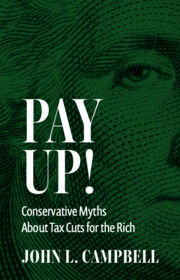Book contents
- Pay Up!
- Pay Up!
- Copyright page
- Dedication
- Epigraph
- Contents
- Figures
- Tables
- Preface
- Abbreviations
- 1 Conservative Myths About Tax Cuts
- 2 Too High, or Much Ado About Nothing?
- 3 Crippling Economic Performance?
- 4 Waste Not, Want Not?
- 5 What’s Fair?
- 6 Freedom under Siege?
- 7 The Persistence of Myths
- Afterword
- Appendix The Price to Pay for Low Taxes
- References
- Index
3 - Crippling Economic Performance?
Published online by Cambridge University Press: 26 June 2025
- Pay Up!
- Pay Up!
- Copyright page
- Dedication
- Epigraph
- Contents
- Figures
- Tables
- Preface
- Abbreviations
- 1 Conservative Myths About Tax Cuts
- 2 Too High, or Much Ado About Nothing?
- 3 Crippling Economic Performance?
- 4 Waste Not, Want Not?
- 5 What’s Fair?
- 6 Freedom under Siege?
- 7 The Persistence of Myths
- Afterword
- Appendix The Price to Pay for Low Taxes
- References
- Index
Summary
Conservatives claim that high taxes undermine national economic performance. Yet comparisons of economic growth rates across the advanced countries and across the US states provide little support for the idea that high taxes necessarily hurt economic growth. There is also little evidence that high taxes hurt labor productivity or capital investment, or that governments engage in a tit-for-tat “race to the bottom” by competing to see who can lower taxes the most to encourage investment. Furthermore, data do not support the claim that reducing taxes is necessary to improve a country’s international economic competitiveness. Countries can stimulate economic growth, improve labor productivity, and facilitate economic competitiveness in many ways that do not require low levels of taxation. Those that use government revenues to fund education, research and development, and scientific and technological innovation, for instance, do very well even with high taxes.
Keywords
Information
- Type
- Chapter
- Information
- Pay Up!Conservative Myths About Tax Cuts for the Rich, pp. 52 - 80Publisher: Cambridge University PressPrint publication year: 2025
